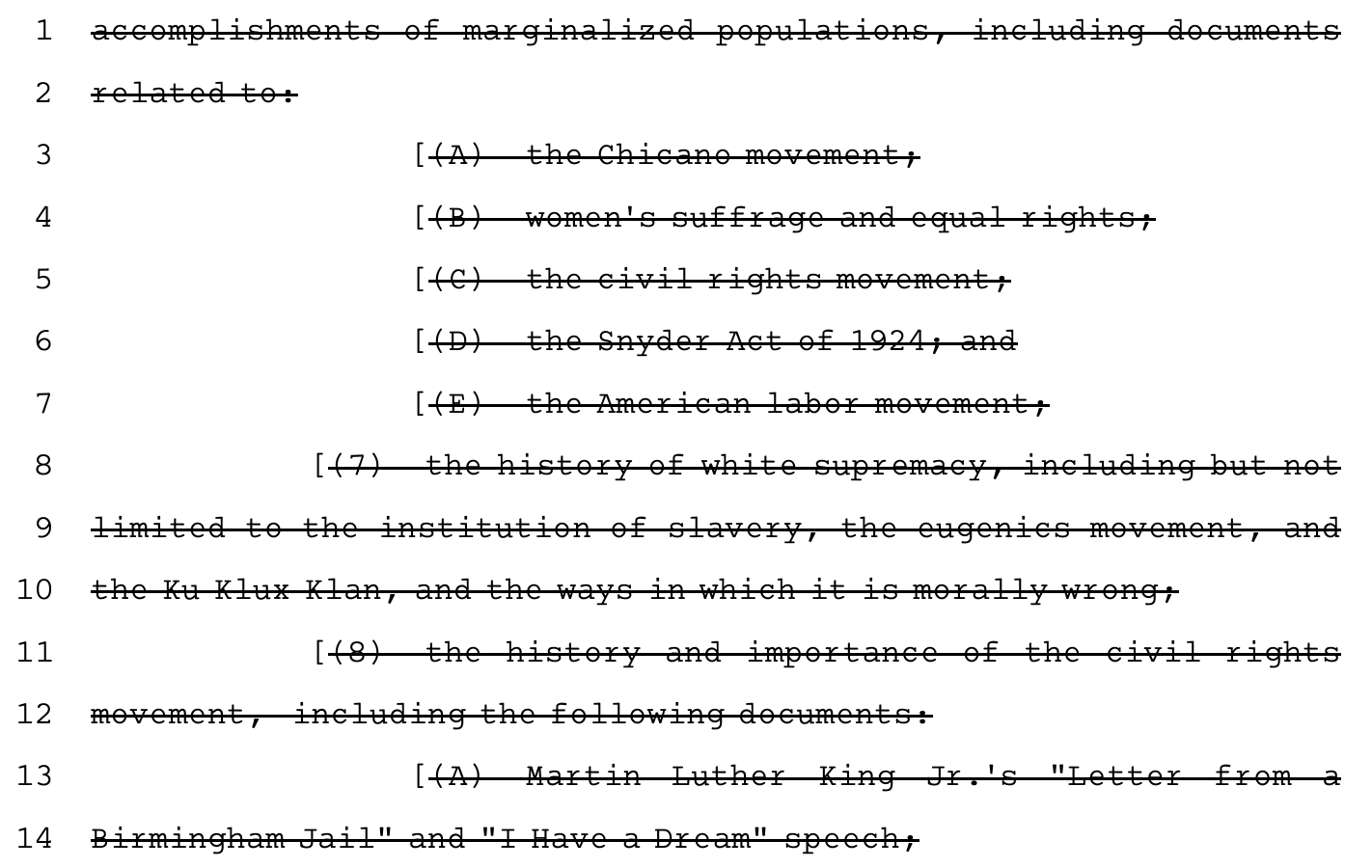Gina Peddy, the Executive Director of Curriculum and Instruction of Carroll Independent School District in Southlake, Texas, was recorded in a training session advising teachers to “make sure that if you have a book on the Holocaust [in a classroom library], that you have one that has an opposing, that has other perspectives.”
This isn’t a story about one official’s off-the-wall comments, though. Instead, it’s about a state struggling to deal with a vague, ominous law that restricts which kinds of books are allowed in classrooms. It’s part of the latest push to ban “Critical Race Theory” in schools, which is now being applied to anything that touches on race or racism — or sometimes, just to any books with people of color as the main characters. Tennessee and Pennsylvania have passed similar laws.
The new law restricts anything that could mean “any individual should feel discomfort, guilt, anguish, or any other form of psychological distress on account of his or her race or sex.” The way this is being interpreted, any conversations about racism — whether historical or current day — could cause a white student to feel guilt or discomfort. It also mandates that “teachers who choose to discuss current events or widely debated and currently controversial issues of public policy or social affairs shall, to the best of their ability, strive to explore such issues from diverse and contending perspectives without giving deference to any one perspective.”
It’s these two sections, which can be interpreted many different ways, that have teachers panicking. In Southlake, they have good reason to be worried. Last year, 4th grade teacher Rickie Farah had a student borrow This Book Is Anti-Racist by Tiffany Jewell from her classroom library, and the students’ parents complained. Afterwards, Carroll administrators investigated and found Farah had not violated any rules — but earlier this month, they school board reversed this decision, voting 3-2 to reprimand Farah. Sheri Mills, one of the board members who voted against the disciplinary actions, said,
I would like to let the teachers know, if you are worried about teaching in this school district, that you should watch this vote. I want you to know that you are right to be worried.
Farah had recently been named the school’s 2021 teacher of the year.
On October 7th, teachers were told to close their classroom libraries until they could vet each of the books, and they were given a rubric of what kinds of books are acceptable to stock and which aren’t.
Teachers responded by covering their classroom libraries with warning tape and signs reading, “You can’t read any of the books on my shelves.” The Superintendent of the district sent a message home to parents saying, “I would like to take this opportunity to set the record straight. The district has not mandated that any book be removed from teachers’ classroom libraries. Additionally, the district has not provided any training on removing books.”
Teachers in the district say this is untrue — and based on the recordings as well as the rubric, it’s hard to disagree with them. During Peddy’s training, she also sent mixed messages about the state of classroom libraries, originally advising teachers to close libraries until they can read all of the books, which could take months, and then saying that wasn’t necessary.
Between the rubric and the ambiguous law, teachers are finding it difficult to know which books could be considered offensive. And after what happened to Farah, they don’t believe the district will have their backs if a parent complains. The district has already deemed Scholastic News an overly liberal news source inappropriate to teach in their schools.
One teacher said, “How am I supposed to know what 44 sets of parents find offensive? We’ve been told: ‘The parents are our clients. We have to do what they want.’ And this is what they want.” Another said,
One of the questions we’re supposed to ask is ‘Does the writer have a neutral stance on the topic?’ Well, if you are Toni Morrison, how can you have a neutral stance toward racism?
Peddy was not defending the law and was sympathetic to teachers’ fears: “We are in the middle of a political mess… And so we just have to do the best we can do.” She added, “You are professionals… We trust you with our children. So if you think the book is okay, then let’s go with it. And whatever happens, we will fight it together. We will.” Unfortunately, based on the district’s record on challenges like this, the sentiment is not very reassuring. “I think you are terrified,” Peddy said. “And I wish I could take that away. I do. I can’t. I can’t do that.” She also added that school districts across Texas are struggling with this new law, and “no one knows how to navigate these waters.”
Republican Senator Bryan Hughes, who wrote Senate Bill 3, said that the law doesn’t apply to matters of “good or evil” like the Holocaust and stated, “That’s not what the bill says.” The bill is so broad and nonspecific, though, that it can be interpreted many different ways. Who decides what is controversial and when teaching “both sides” is necessary?
Carroll school district Superintendent Lane Ledbetter also put out a statement that the district was “in no way to convey that the Holocaust was anything less than a terrible event in history” and that “we recognize there are not two sides of the Holocaust.” He added that they understand the bill “does not require an opposing viewpoint on historical facts.” Though as we’ll get into, that may not be so straightforward.
A spokesperson for the Texas State Teachers Association said that the guidelines around classroom libraries are a “misinterpretation” of the bill and an “overreaction,” since classroom libraries are not named in the law.
An updated version of the bill, Texas Senate Bill 3, goes into effect in December. It strips out topics required to be taught in Social Studies, including removing any requirement to teach Native American history.

Other struck out sections include writings from Frederick Douglass, the history of the civil rights movement, as well as Martin Luther King Jr’s “I Have a Dream” speech.

While the Superintendent stated that the law does not oppose historical facts, this updated bill suggests otherwise. While it doesn’t outlaw teaching about these facts, it makes them optional. Teaching about racism at all has led to many teachers getting parent complaints about making students feel “guilty” for being white, which may bring disciplinary action against them under the bill.
These laws come at a time where the country is already facing a teacher shortage. Teachers have dealt with inadequate Covid-19 precautions, abrupt changes in their routine — including having to redesign their curriculum on the fly for online teaching — and a traumatized student population who is dealing with mental health difficulties after successive school years in a pandemic.
This is on top of a job that already asks educators to work unpaid overtime on a regular basis, that overcrowds classrooms with students and cuts funding for supplies. These beautiful, diverse classroom libraries that teachers are covering up? They were likely purchased out of their own pockets, just to help give kids access to books that are relevant and compelling for them.
These bills and this kind of censorship drives great teachers out of the profession — after all, the teacher who was reprimanded for carrying This Book is Antiracist was named the best teacher of the year before that. For teachers who stay, it encourages them to stick to the most bland possible version of the curriculum. It robs students the chance of having important conversations about the world around them. It prevents kids from learning about how to be a good ally and how to see the world from someone else’s perspective. It raises a population of less educated people.
If you want to prevent this from happening in your hometown, check out this anti-censorship toolkit and look into sitting on your library board and school board. We need passionate people advocating against censorship and for antiracist teaching that are just as loud as the pro-censorship crowd.
